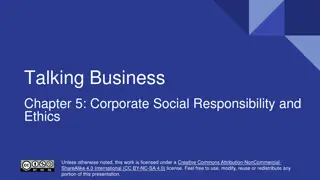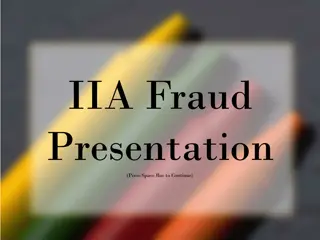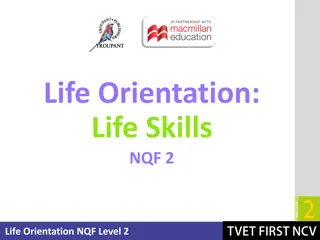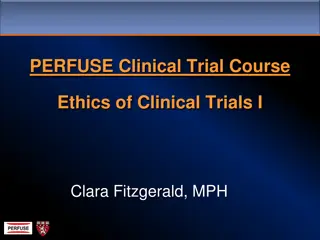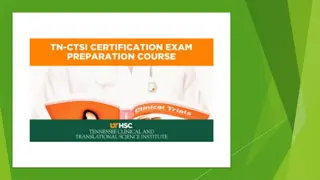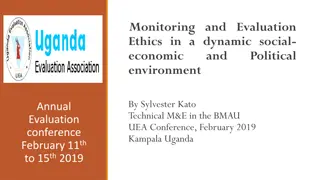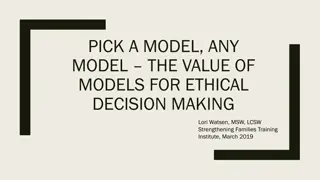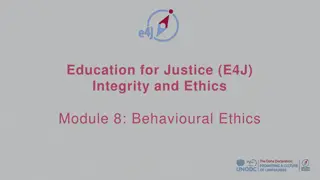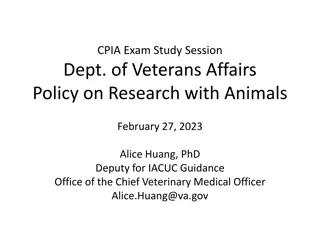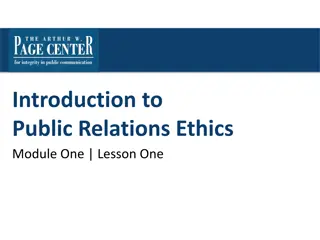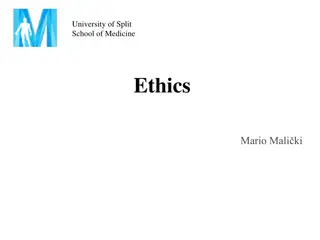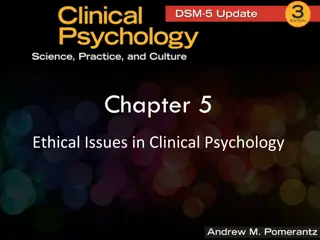Ethical Studies Course Overview and Activities
Delve into the world of Ethical Studies with this comprehensive course overview. Explore themes like Ethical Language and Thought, Natural Law, Situation Ethics, and more. Engage in activities like Virtue Ethics starters, fortune line graphs, and discussions on moral dilemmas. Dive into the principles of Pragmatism, Relativism, Positivism, and Personalism through creative expression. Immerse yourself in critical thinking and ethical debates surrounding important contemporary issues.
Download Presentation

Please find below an Image/Link to download the presentation.
The content on the website is provided AS IS for your information and personal use only. It may not be sold, licensed, or shared on other websites without obtaining consent from the author.If you encounter any issues during the download, it is possible that the publisher has removed the file from their server.
You are allowed to download the files provided on this website for personal or commercial use, subject to the condition that they are used lawfully. All files are the property of their respective owners.
The content on the website is provided AS IS for your information and personal use only. It may not be sold, licensed, or shared on other websites without obtaining consent from the author.
E N D
Presentation Transcript
2015-16 GCE Religious Studies
Introduction In the palm of your hand write out what is your motto in life. Draw around your hand on a piece of paper. In the fingers and thumb write down words that would describe your personality. Share with the person next to you. This is a good Virtue Ethics starter.
Theme 1- Ethical Language and Thought Moral Absolutism Moral Relativism Normative Approaches: Deontological Teleological The attainment of Virtues
F ortune L ine G raph Pick a scholar card. Decide where to place the card once the dilemma has been given e.g. would Aquinas agree, be divided or disagree with abortion? Get the students to justify their viewpoint.
Theme 2: Natural Law Aquinas Natural Law Key aspects of the theory Application of Natural Law to: Abortion Panorama on the issues of abortion in Ireland The great abortion divide Voluntary Euthanasia Silent debate
Theme 3: Situation Ethics Fletcher s Situation Ethics Fletcher s Ten Principles of Situation Ethics (4 working principles & 6 fundamental principles. The application of Situation Ethics to: Homosexuality- Use 2012-2013 news articles on the debating between the church and the government on the 2014 Gay Marriage Act. Polyamorous relationships Made in Chelsea- Rosie meets a someone who is polyamorous and refuses to date him.
The Four Working Principles Pragmatism To be right, the proposed course of action must work. Relativism Scholars who support situation ethics reject words like never , always and absolute as they believe that circumstances can always throw up exceptions. Positivism Fletcher claims that there are only two ways of understanding religious knowledge or belief: Theological Naturalism and Theological Positivism. Theological Positivism is based upon love and nothing else. Personalism Ethics deals with human relations and situation ethics puts people at the centre. You will be given one of the 4 working principles- you have to explain it in a creative way e.g. a drama, a rap or a poster. It can be serious or humorous. You must include the following: The principle An explanation A quote Lots of examples
Theme 4: Utilitarianism Bentham s Act Utilitarianism (Principle of Utility & Hedonic Calculus) Mill s development of Utilitarianism (Rule, higher & Lower pleasures) Application of Act & Rule Utilitarianism to both personal, societal and global issues listed below: Animal experimentation for medical research Deep Blue Sea For once the scientists aren t evil. In fact they are trying to find a cure for Alzheimer s. Unfortunately they make the schoolboy error of going straight from mice to sharks and the results are predictable The use of nuclear weapons as a deterrent useful film-Sum of All Fears -The threat of a nuclear detonation on United States soil, young CIA analyst Jack Ryan (Ben Affleck) must uncover who is behind the conspiracy.
Help with the Specification Glossary Mark scheme Resources Questions?
A level Ethics Theme 1: Ethical Language and Thought Concepts of and major differences between moral absolutism and Moral Relativism. Normative Ethical approaches: A deontological Approach A teleological approach The attainment of Virtues Bingo Other ethical approaches Divine Command Theory Meta-Ethical Approaches: Intuitionism Meta-ethical approaches: Emotivism
What are the similarities and differences between Intuitionism and Emotivism? Emotivism Intuitionism Differences Differences Similarities
Theme 2: Deontological Ethics Aquinas Natural Law John Finnis Development of Natural Law. The application of Natural to both of the personal, societal and global issues listed below: Abortion Voluntary Euthanasia Kant s Moral Theory W.D. Ross development of Kant s Categorical Imperative. Application of these ideas to: Immigration- Political debate Corban V Farage Capital Punishment Court Case Tookie Lesson idea: put people in 4 groups and create board games explaining each scholars view to the ethical issues.
Theme 3: Teleological Ethics Fletcher s Situation Ethics Bernard Hoose s Proportionalism - Hybrid of Situation Ethics Application to: Homosexual Relationships Polyamorous Relationships Bentham s Act Utilitarianism Singer s Preference Utilitarianism Application to: Animal experimentation for medical research The use of nuclear weapons as a deterrent. Lesson idea: Model making.
Theme 4: Free Will and Determinism A) Religious concepts of predestination and free will: Religious views on predestination: Augustine & Calvin Religious views on Free Will: Pelagius & Arminius B) Concepts of Determinism & Libertarianism. Hard Determinism: Philosophical (John Locke), Scientific and psychological. Soft Determinism: Caused acts v forced acts (Ayer); internal and external causes (Hobbes) Libertarianism: Philosophical (Sartre), Scientific (Free floating DNA Sirigu) and psychological (humanism- Rogers) C) The relationship between determinism & Free will with moral responsibility The relationship between determinism and free will with religious belief.
Free Will and Determinism Lesson We do not possess any genuine freedom to act ethically. Kinaesthetic debating Setting the scene- research Ted Bundy. Law court scenario- provide a statement of contention, Ted Bundy had no control over his actions and therefore should not be put to death. Split the class into two groups. Get the most confident students to be the two lawyers (defence Hard determinism V prosecution- Libertarianism) Reflection- Kinaesthetic debate.
Help with the Specification Glossary Mark scheme Resources Questions?







